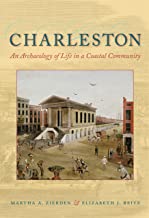University of Florida Press
Charleston- An Archaeology of Life in a Coastal Community ~ Martha Zierden & Elizabeth Reitz
Charleston- An Archaeology of Life in a Coastal Community ~ Martha Zierden & Elizabeth Reitz
Couldn't load pickup availability
Charleston, South Carolina, is one of the most storied cities of the American South. Well known for its historic buildings and landscape, its thriving maritime culture, and its role in the beginning of the American Civil War, many consider it the birthplace of historic preservation. In Charleston, Martha Zierden and Elizabeth Reitz—whose archaeological fieldwork in the city spans more than three decades—reveal a vibrant, densely packed city, where people, animals, and colonial activity carried on in close proximity. Examining animal bones and the ruins of taverns, markets, townhouses, and smaller homes, the authors consider the residential, commercial, and public life of the city and the dynamics of production, distribution, and consumption of goods and services that linked it with rural neighbors and global markets.
From early attempts at settlement and cattle ranching to the Denmark Vesey insurrection and efforts to improve the city’s drinking water, Zierden and Reitz explore the evolution of the urban environment, the intricacies of provisioning such a unique city, and the urban foodways and cuisine that continue to inspire Charleston’s culinary scene even today.
Used hardback
Share


